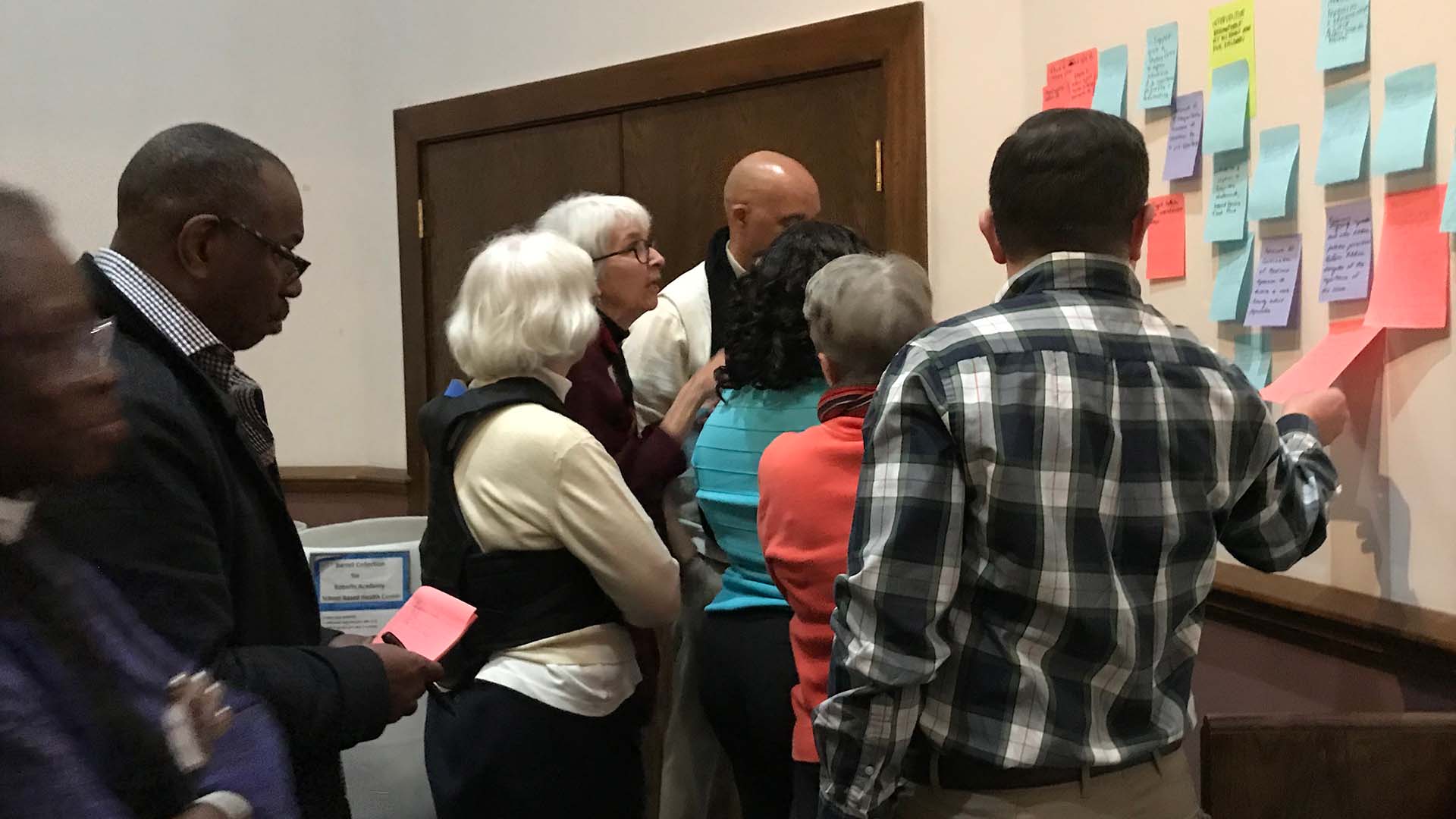We believe in Uniting under one common voice.
We are a coalition of judicatories. By judicatories, we mean the local, decision-making bodies of national denominations. Each of these judicatories is a valid, autonomous body. MARCC is the organized coalition that enables the 14 Jewish, Roman Catholic, Muslim, Protestant, Unitarian-Universalist judicatories to collaborate together on a few local social concerns to improve life for the people of Metropolitan Cincinnati.
In the language of the sacred texts, the religious community can work on social problems in three ways:
As an organized body of religious leaders, MARCC has made a self-conscious decision to work together to address social concerns in a sovereign or political way.
HOW MARCC WORKS

At the MARCC Fall Planning Conference where Social Concern Priorities are ranked and for the year to determine organizational focus.
We have a small but mighty paid staff who works out of a Cincinnati-based office and supports the collaborative organizing efforts and decisions of the Executive Board and the Delegates Council. Monthly meetings are held with the Executive Committee and the Delegates Council to make decisions and to discuss issues and actions. As a non-profit organization, we are financially supported through the annual contributions of our Judicatory members and friends of MARCC.
Every November during our Fall Planning Conference, our Delegates gather to share dinner and discuss pressing issues that impact the residents of Cincinnati. Judicatories then vote from a list of four or five possible social concerns to choose the top two which will be the priority social concerns of focus for the following year. Progress is reported at each Annual Meeting, when members also review action items from the previous year, adopt an operating budget, and elect new officers.
the role of the executive committee
Members of the Executive Board are elected officials and board members from each member Judicatory. They manage the organizational policy, employ the executive office staff, review proposals and strategies, guide actions on issues and projects, recommend appointments for committees and task forces, and review public statements and advocacy testimonies.
The role of the delegates council
The Delegates Council consists of three individuals from each of the member Judicatories. The Delegates can be either clergy or lay people, and they have the organizational authority to implement policies and to create project committees and task forces. Meetings are held monthly and include a guest speaker.
The judicatory members
MARCC’s judicatory members are faith-based organizations of diverse religious backgrounds. Through their annual financial contributions, they fund MARCC’s activities. Judicatories also participate by voting on the social concerns of focus, appointing delegates and leaders, and attending MARCC and partner events.
Our Story
MARCC creates an organizing platform for social change. In the 1960s, a small handful of Jewish, Catholic, and Protestant activists and organizers met regularly to discuss their moral and political civic responsibilities. Discrimination was their area of focus, and their state-level advocacy efforts helped pass laws prohibiting discrimination during employment, accommodation, and housing practices.
The 1967 uprisings woke many more congregational leaders into action. It was clear that the new laws against discrimination were not yet effective and more dialogue and organized action was necessary. Religious leaders such as Bishop Roger Blanchard, Rabbi Albert Goldman, Monsignor Ralph Asplan, and The Reverend Paul Long began cooperative talks to plan steps. From these insights and activists MARCC, The Metropolitan Area Religious Coalition of Cincinnati, was initiated.
MARCC’s presence was soon an imprint upon the Cincinnati social landscape. On the afternoon of April 4, 1968, the City of Cincinnati Mayor Eugene Ruehlmann convened a meeting to discuss the city’s deepening racial crisis. He invited business, educational, industrial, human relations, and community leaders; he also sought a voice from the religious community. This became the first public appearance of the newly-organized MARCC.
Over the past nearly sixty years, three executive directors have led MARCC. The first was Bishop C. Joseph Sprague (1968-1973), followed by the enduring tenure of Reverend Duane Holm (1973-2006) who held the organization together and moved it forward through many challenges, and now Margaret A. Fox (2006-Present). Ms. Fox was mentored by both leaders, first as a college intern and then an associate director. Since the beginning, MARCC has been working effectively behind the scenes with City Council, Cincinnati Police Department, Cincinnati Metropolitan Housing Authority, Cincinnati Public Schools, and Hamilton County Jobs and Family Services, among other influential decision-making institutional and administrative bodies.
Now, we know that churches, synagogues, and gatherings are more effective together. Now, our voices can be heard as one to help create positive change. In the 21st century MARCC continues to be a vital voice for justice that speaks from a coalition of many faiths.

